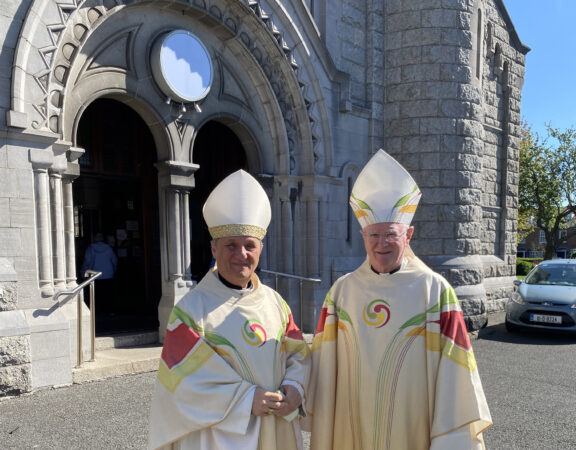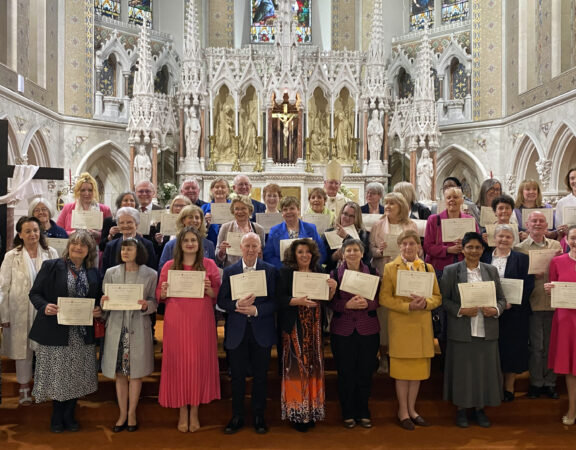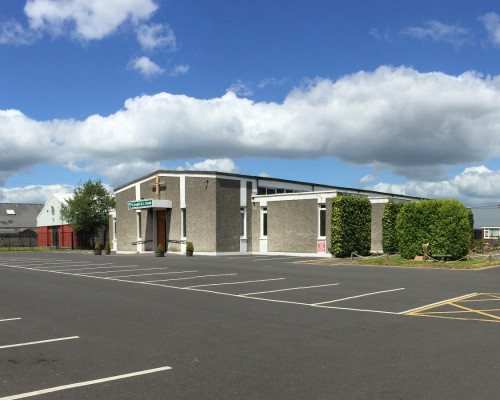Feast of the Presentation of the Lord 2014
MASS ON THE OCCASION OF THE 20TH ANNIVERSARY OF THE L’ARCHE COMMUNITY IN DUBLIN
Homily Notes of Archbishop Diarmuid Martin
Church of Saint Francis Xavier, Gardiner Street, 2nd February 2014
“At this Mass on the Feast of the Presentation of Jesus in the Temple we also gather to celebrate with our friends of the L’Arche Community in Dublin. The other evening, I looked at the website of the Dublin L’Arche community and I noted a phrase that struck me: “Celebration is very important to us. We enjoy celebrating birthdays and anniversaries. In fact, we often find lots of other reasons to celebrate and have a party”.
This year of 2014 is a year when the L’Arche community in Dublin has much to celebrate. The roots of the community go back to a small gesture of hospitality by the founder of L’Arche, Jean Vanier, who brought into his own home two men with developmental disabilities who would otherwise have remained in institutions. That took place in 1964, fifty years ago this year. This evening we celebrate in particular the twentieth anniversary of the opening of the first L’Arche house in Dublin, on the 1st of February 1994, twenty years ago. I greet all those who belong that the Dublin community and all their friends who are with us.
Jean Vanier is a remarkable man. Son of a diplomat, he was a distinguished philosopher and theologian in his own right. He could well have made a career for himself in a wide range of professions. From his youth, however, and especially from his experiences during the Second World War, he felt an inner call not just to be successful in life in a profession, but to do something different in his life, especially with men and women whose life was marked by disability and for whom the only care available was in anonymous institutions.
We talk about the L’Arche community: that is what L’Arche is. Each community is made up of people with and without intellectual disabilities, sharing life in community, recognising both the unique value of every person and the need we have of each another. Men and women with intellectual disabilities are not treated as clients or as objects of care, but men and women with special gifts. These gifts are recognised and in fact are brought out and fostered through an atmosphere of transforming relationships. L’Arche is inspired by faith in Jesus Christ and wishes to witness to how faith in Jesus Christ must be lived out in love.
We celebrate the Feast of the Presentation in the Temple. Joseph and Mary bring their newborn child to the Temple to fulfil what is set out in the Law of Moses. There they encounter two elderly people: Simeon and Anna, people of a different generation. Simeon is described as an upright and devout man on whom the Holy Spirit rested. Anna, who spent much of her time in the Temple, looked forward to the deliverance of Israel. Together they become almost a bridge between those who lived in the expectation of the saviour and the new dispensation in which Jesus would proclaim a new law: the commandment of love.
These four figures are there as Jesus is presented in the Temple to see the Law of Moses fulfilled. This Jesus is the one who will bring the Law of Moses to fulfilment and who through his teaching and his life will reveal to us not just a new law, but a new understanding of who God is. The new law of love rests on a deeper understanding of who God is. Jesus through his life and death becomes the revelation of a God of love. Encountering God, therefore, is always and experience of love which deepens our ability to love and calls us to be people who love.
So many people, both within the Church and outside the Church, feel that our God is a God of laws and rules and precepts. No, our God, as he is revealed in Jesus Christ is fundamentally a God of love, and any laws are there to guide us along a path of love and to convert our hearts into being people of love.
The Christian community has to find new ways of placing that centrality of love into the way we live and witness as individuals and as a Church. The commandment of love is not just about being involved in supporting good causes. It is always about witnessing to God’s love in our own lives. It is about changing our hearts, purifying them from self-centredness and disinterest.
The L’Arche community witnesses to that fundamental dimension of what is an essential must be part of being a Christian: we cannot simply delegate love to others; we cannot witness to love by simply establishing foundations and institutions; we cannot witness to love simply by creating charitable organizations to look after the poor, no matter how good these organizations are. Love requires encounter. Love involves that type of partnership which exists in L’Arche communities, where people share their lives and are enriched by each other; it involves relationships which do not talk about clients and carers, but one in which the people truly encounter each other and discover in each other that unique dignity which belongs to every child of God.
Pope Benedict, in his Encyclical Des Caritas Est, notes that: “Those who work for the Church’s charitable organizations must be distinguished by the fact that they do not merely meet the needs of the moment, but they dedicate themselves to others with heartfelt concern, enabling them to experience the richness of their humanity. While professional competence is a primary, fundamental requirement, it is not of itself sufficient. We are dealing with human beings, and human beings always need something more than technically proper care. They need humanity. They need heartfelt concern”.
Pope Benedict also spoke of the need to address what he called: “the activism and the growing secularism of many Christians engaged in charitable work”. If we wish to truly witness to the love of God as revealed in Jesus Christ our own lives must be marked a personal relationship with God and abandonment to his will. This requires that we develop a spirit of prayer which will enable us never to loose our spirit and our hope, just as Simeon and Anna remained faithful to a hope as they lived in the unknowns of their times.
As we wish the Dublin L’Arche community well for the years to come, we should also renew in our own lives a spirit of love and work to bring that love into the life of what Pope Francis constantly calls “the periphery” of our society and of our times. He is speaking not just of the geographical or economical peripheries of society, but of the profound peripheries of alienation and hopelessness and search for meaning and purpose that exists among the men and women of our time. The Church can never be just an inward-looking society, preoccupied by its own challenges. The more the Church becomes over concerned by its internal challenges the more it will actually become more inward looking and never the out-going reflection of the challenging message of Jesus who cares. ENDS









